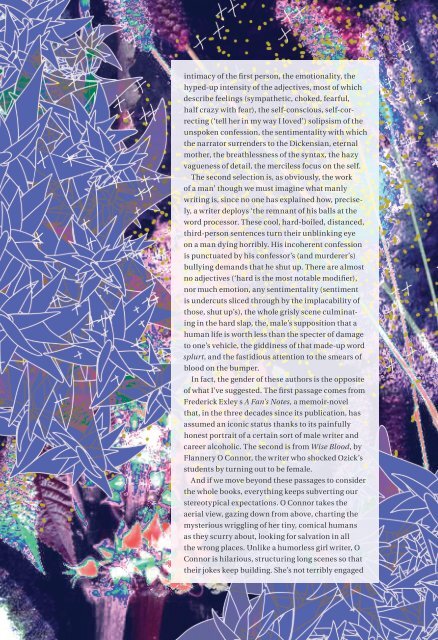magazine_final_online
You also want an ePaper? Increase the reach of your titles
YUMPU automatically turns print PDFs into web optimized ePapers that Google loves.
intimacy of the first person, the emotionality, the<br />
hyped-up intensity of the adjectives, most of which<br />
describe feelings (sympathetic, choked, fearful,<br />
half crazy with fear), the self-conscious, self-correcting<br />
(‘tell her in my way I loved’) solipsism of the<br />
unspoken confession, the sentimentality with which<br />
the narrator surrenders to the Dickensian, eternal<br />
mother, the breathlessness of the syntax, the hazy<br />
vagueness of detail, the merciless focus on the self.<br />
The second selection is, as obviously, the work<br />
of a man’ though we must imagine what manly<br />
writing is, since no one has explained how, precisely,<br />
a writer deploys ‘the remnant of his balls at the<br />
word processor. These cool, hard-boiled, distanced,<br />
third-person sentences turn their unblinking eye<br />
on a man dying horribly. His incoherent confession<br />
is punctuated by his confessor’s (and murderer’s)<br />
bullying demands that he shut up. There are almost<br />
no adjectives (‘hard is the most notable modifier),<br />
nor much emotion, any sentimentality (sentiment<br />
is undercuts sliced through by the implacability of<br />
those, shut up’s), the whole grisly scene culminating<br />
in the hard slap, the, male’s supposition that a<br />
human life is worth less than the specter of damage<br />
to one’s vehicle, the giddiness of that made-up word<br />
splurt, and the fastidious attention to the smears of<br />
blood on the bumper.<br />
In fact, the gender of these authors is the opposite<br />
of what I’ve suggested. The first passage comes from<br />
Frederick Exley s A Fan’s Notes, a memoir-novel<br />
that, in the three decades since its publication, has<br />
assumed an iconic status thanks to its painfully<br />
honest portrait of a certain sort of male writer and<br />
career alcoholic. The second is from Wise Blood, by<br />
Flannery O Connor, the writer who shocked Ozick’s<br />
students by turning out to be female.<br />
And if we move beyond these passages to consider<br />
the whole books, everything keeps subverting our<br />
stereotypical expectations. O Connor takes the<br />
aerial view, gazing down from above, charting the<br />
mysterious wriggling of her tiny, comical humans<br />
as they scurry about, looking for salvation in all<br />
the wrong places. Unlike a humorless girl writer, O<br />
Connor is hilarious, structuring long scenes so that<br />
their jokes keep building. She’s not terribly engaged


